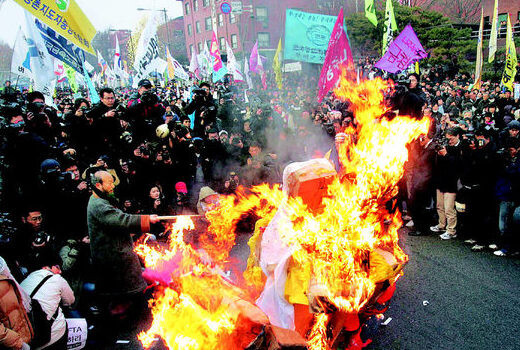hankyoreh
Links to other country sites 다른 나라 사이트 링크
S.K.-U.S. free trade deal would violate 169 Korean laws: critics

Opposing voices in South Korea say that U.S. demands raised in free trade negotiations with South Korea would violate up to 169 domestic laws.
According to sources, the South Korean delegation to the negotiations has already decided to accept a considerable number of the U.S. demands, while the U.S. has not made concessions resulting in the amendment of any of its federal laws, such as an anti-dumping law which the South Korean team has continually addressed at the free trade talks.
At a joint press conference with Rep. Choi Jae-chun of the ruling Uri Party on January 16, a representative of the Korean Alliance Against the KORUS (Korea-U.S.) FTA said, "After a month-long examination performed by 17 experts, about 15 percent, or 169, of the 1,163 domestic laws must be amended because they conflict with the contents of the FTA negotiations."
"To change the current law on automobile taxes following the U.S. demand, six laws, including a special consumption tax law and a local tax law, must be rewritten. We have researched the issues in question because the FTA negotiators had reported to the National Assembly’s special committee that more than 30 laws should be altered or abolished, but did not reveal any details," said Rep. Choi.
The government has already promised to the U.S. to revise some of the laws. Cases in point are the fair trade law and the labor law.
Nam Hui-seop, a patent attorney with the anti-FTA group who examined a section regarding intellectual property rights said the government will have to rewrite a number of laws, such as South Korea’s copyright act and patent regulations.
In connection with policies aimed at stabilizing real estate prices, as well, 14 laws, including those concerning housing and profits earned from development, should be amended, the group said. An official of the Ministry of Construction and Transportation warned, "The United States carries out real estate policies by means of interest rates, while South Korea directly controls the market through real estate-related regulations. If the two nations sign the FTA, it is highly possible that U.S. investors will file lawsuits against such regulations."
When a conflict arises due to FTA concerns, in South Korea the FTA has legal force equivalent to that of domestic law, just under the Constitution, but in the U.S. federal law takes precendence over the trade agreement, said experts. The U.S. delegation has never made concessions requiring the amendment of its federal laws, and they are not likely to do so regarding important issues, considering the proposed March 2007 deadline for the end of negotiations. The U.S. Trade Representives revealed their position regarding this issue on December 27, when they submitted to U.S. Congress a report which included the caveat, "To the extent these proposals could require amendments to [anti-dumping laws], the proposals Korea are currently advancing will not be included in the final agreement."
On the second day of the sixth round of negotiations, the two nations discussed eight sections, including finance and agriculture. The U.S. demanded that South Korea open its credit evaluation market as a part of inter-border financial transactions. Such an opening would allow U.S.-based credit rating companies to compete with South Korean firms, while not having to establish offices in this country.
Please direct questions or comments to [englishhani@hani.co.kr]
Editorial・opinion
![[Column] Season 2 of special prosecutor probe may be coming to Korea soon [Column] Season 2 of special prosecutor probe may be coming to Korea soon](https://flexible.img.hani.co.kr/flexible/normal/500/300/imgdb/original/2024/0426/3317141030699447.jpg) [Column] Season 2 of special prosecutor probe may be coming to Korea soon
[Column] Season 2 of special prosecutor probe may be coming to Korea soon![[Column] Park Geun-hye déjà vu in Yoon Suk-yeol [Column] Park Geun-hye déjà vu in Yoon Suk-yeol](https://flexible.img.hani.co.kr/flexible/normal/500/300/imgdb/original/2024/0424/651713945113788.jpg) [Column] Park Geun-hye déjà vu in Yoon Suk-yeol
[Column] Park Geun-hye déjà vu in Yoon Suk-yeol- [Editorial] New weight of N. Korea’s nuclear threats makes dialogue all the more urgent
- [Guest essay] The real reason Korea’s new right wants to dub Rhee a founding father
- [Column] ‘Choson’: Is it time we start referring to N. Korea in its own terms?
- [Editorial] Japan’s rewriting of history with Korea has gone too far
- [Column] The president’s questionable capacity for dialogue
- [Column] Are chaebol firms just pizza pies for families to divvy up as they please?
- [Column] Has Korea, too, crossed the Rubicon on China?
- [Correspondent’s column] In Japan’s alliance with US, echoes of its past alliances with UK
Most viewed articles
- 1[Column] Season 2 of special prosecutor probe may be coming to Korea soon
- 2No good, very bad game for Korea puts it out of Olympics for first time since 1988
- 3‘We must say no’: Seoul defense chief on Korean, USFK involvement in hypothetical Taiwan crisis
- 4Division commander ordered troops to enter raging flood waters before Marine died, survivor says
- 5Is Japan about to snatch control of Line messenger from Korea’s Naver?
- 6Korea’s 1.3% growth in Q1 signals ‘textbook’ return to growth, says government
- 7Is N. Korea threatening to test nukes in response to possible new US-led sanctions body?
- 8[Editorial] Korea’s surprise Q1 growth requires objective assessment, not blind fanfare
- 9[Editorial] New weight of N. Korea’s nuclear threats makes dialogue all the more urgent
- 10[Editorial] In the year since the Sewol, our national community has drowned